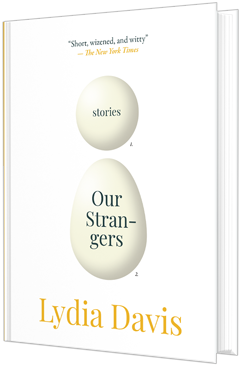Our Strangers
by Lydia Davis
Lydia Davis is equally renowned as an author and translator, with a novel, short story collections, and essay volumes to her name, in addition to a celebrated English translation of Gustave Flaubert's Madame Bovary in 2010. It's little surprise, then, that in Our Strangers, her ninth collection of mostly flash-length stories, an overarching theme is the mystery of human communication and connection. Davis's pithy observations and chance conversations feel drawn from life; small-town encounters and foreign travel alike present opportunities for everyday epiphanies.
The flash form--with most entries ranging from just one sentence to several pages in length--allows space for a whopping 143 stories, a real cornucopia of genres, structures, and voices. Roughly half of the stories unwind in first- and third-person narratives, and some also embrace the collective view, with some dozen stories told in the first-person plural. Of these, the title story, one of the overall highlights, is about everyday neighbor interactions: spats, feuds, kindnesses, and reconciliations. "Old Men Around Town" continues in that small-town vein, and "Here in the Country" channels nature writing in how it records human and animal activity in seasonal patterns: "Birds nest under the air conditioner and on the back porch inside a bamboo shade that we rolled up early in the spring to let more light into the bathroom."
"Pardon the Intrusion," too, is a window onto a community's rhythms and concerns. Its format--campus advertisements, offers and requests, increasingly random and occasionally ironic--provides a comedic interlude as well as an illustration of how the author relishes the diversity of how people speak: "Zither found a home, thank you.... Yearling turtle for adoption! It eats sliced turkey.... Sorry for this question, but does anyone know of a preferably small and quiet banjo I might borrow or rent for 2 weeks?" In places, it reads as a found poem. Indeed, a number of the micro-stories, like "Up So Late" and "When We Are Dead and Gone," are printed in stanzas of fragmentary lines, and "Poem of Greeting" renders a spam e-mail as lyrical and charming.
Davis runs the gamut of literary forms here, including aphorisms, dreams, and overheard dialogues. "Incident on the Train" spins a farce out of seeking a fellow passenger to guard one's bags during a restroom visit. "The Other She" is a tongue twister of sorts, while "Three Musketeers" has the didactic repetition of a nursery rhyme. Even within a subgenre--epistolary, for instance--there is wide variety: "Winter Letter" is a long maternal update about a trip to Texas that involved a run-in with a raccoon, while "Dear Who Gives a C***" is a brief, persnickety missive to a toilet paper company with a cheeky name.
There are also several series presented in the collection, with a number or detail appended to a repeating title, such as "Marriage Moment of Annoyance--Coconut" and "Marriage Moment of Annoyance--Insurance." "Claim to Fame #2: Karl Marx and My Father" notes that Davis's father and Karl Marx both had daughters who translated Madame Bovary. Likewise, there appear to be touches of autofiction in "New Things in My Life," voiced by a woman who readily forgets her losses--that she's not still with her first husband and son, that she's not a child who can get away with climbing an apple tree.
Pieces this short tend to rely more on moments of realization than on character study, but sometimes a small detail reveals a lot. One is the holiday dinner an old woman buys for Thanksgiving. The title makes her situation as plain as the two sentences of her story do: "Lonely (Canned Ham)." Aging and the plight of the older woman are recurring subjects, as in "Learning to Sing," a standout narrated in the second person. "You think it will be simple to learn to sing better," yet a sequence of teachers, techniques, and specialists only reiterate how tense this would-be singer is. In a coda to the story, an elderly choir member who sings loudly despite her poor voice serves as a model of confidence.
The book will especially delight word lovers with its focus on the intricacies of language. "Egg," the source of the cover image, opens with a paragraph on the word for "egg" in foreign languages; "Spelling Problem" mulls over the difficulty of the word "hemorrhaging." There is grammatical pedantry, and wordplay--two versions of a story in which a listener mishears the name of the saw-whet owl as "So what." And in a meta twist, Davis at one point provides commentary on the composition of an earlier story.
Our Strangers is an embarrassment of riches--a bounteous sampling for those new to Davis, or to flash fiction. It mines everyday life for its humor and pathos, thrilling to the use of language and taking pleasure in the ridiculous and arbitrary. Better still, it reflects the author's convictions: this is the first work published by Bookshop.org under the imprint Bookshop Editions, and she has stipulated that it will be sold only by independent bookstores and on Bookshop.org, or available through libraries. In other words: Amazon, hands off. --Rebecca Foster







